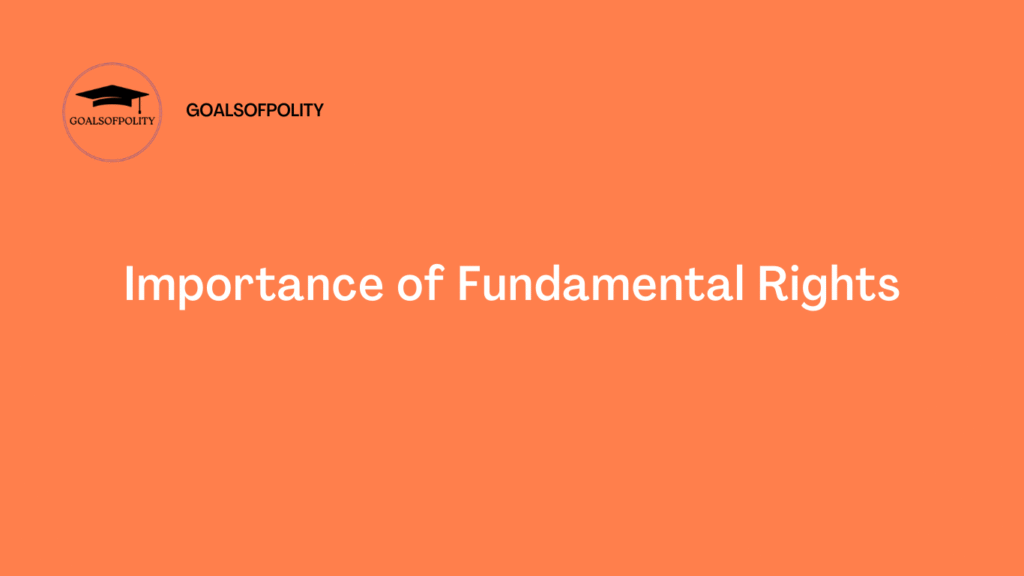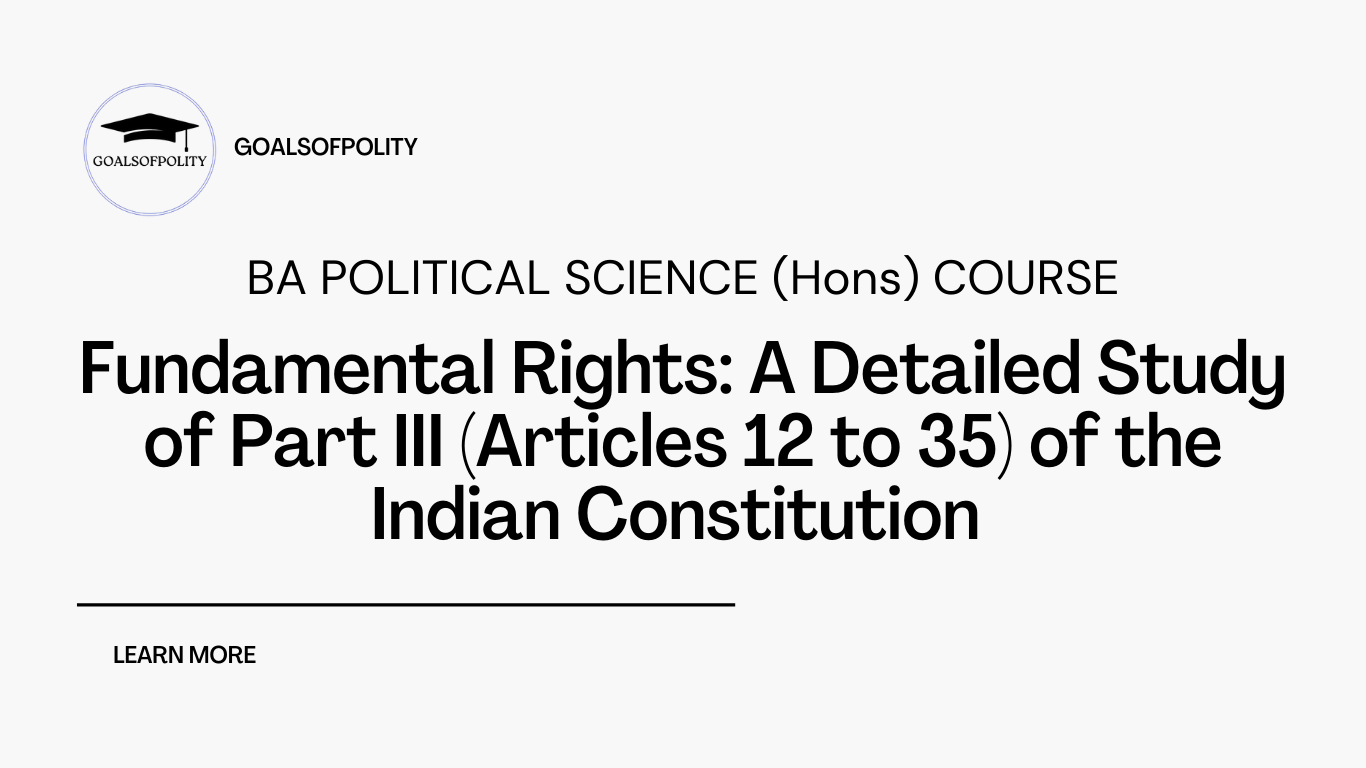Table of Contents:
Introduction:
Fundamental rights are an important component of the Indian Constitution, which form the cornerstone of democracy and ensure the protection of individual liberty against the arbitrary action of the state. These are contained in Part III (Articles 12 to 35) of the Constitution and are considered essential for the development of the dignity of the individual and the promotion of justice, liberty, equality, and fraternity.
These rights are inspired by the Declaration of the Rights of Man and of the Citizen during the French Revolution, the US Constitution’s Bill of Rights, and other global human rights charters.
A. Objectives of Fundamental Rights:
The primary objectives are:
Protection of individual liberties: To protect individual freedoms and rights from state interference and to ensure that no citizen is discriminated against.
Promotion of social justice: To address issues of inequality and social injustice and to ensure that all citizens are treated equally before the law.
Empowerment of citizens: To empower citizens to stand up against any exploitation or injustice.
Balance between state power and individual rights: Maintaining a balance between the powers of the government and the rights of individuals.
B. Categories:
The Indian Constitution uses six major categories to categorize essential rights.
1. Right to Equality (Articles 14-18):
Article 14: Equal protection under the law and equality before society.
Article 15: Prohibition of discrimination on grounds of religion, race, caste, sex or place of birth.
Article 16: Equal opportunities when it pertains to public employment.
Article 17: Abolition of untouchability.
Article 18: Abolition of titles other than military and academic distinctions.
2. Right to Freedom (Articles 19-22):
Article 19: Protection of six rights including freedom of speech and expression, assembly, association, movement, residence, and profession.
Article 20: Protection in respect of conviction for offences (protection against retrospective laws, double jeopardy, and self-incrimination).
Article 21: Protection of life and personal liberty.
Article 21A: Right to elementary education.
Article 22: Protection against arrest and detention in certain cases.
3. Right against exploitation (Articles 23-24):
Article 23: Prohibition of human trafficking and forced labour.
Article 24: Prohibiting youngsters from working in dangerous jobs.
4. Right to freedom of religion (Articles 25-28):
Article 25: Freedom of conscience and freedom to freely profess, practice, and propagate religion.
Article 26: Freedom to manage religious affairs.
Article 27: Freedom from payment of taxes for the propagation of any religion.
Article 28: Freedom at several educational institutions for attending religious instruction.
5. Cultural and Educational Rights (Articles 29-30):
Article 29: Protection of the interests of minorities by ensuring their right to preserve their culture, language, and script.
Article 30: Right of minorities to establish and administer educational institutions.
6. Right to Constitutional Remedies (Article 32):
Known as the “heart and soul” of the Constitution, this Article gives citizens the right to move the Supreme Court or High Courts for the enforcement of fundamental rights. Dr. B.R. Ambedkar considered this Article as one of the most important Articles in the entire Constitution.
Article 33 – Power to amend rights of armed forces:
Objective: To ensure discipline and proper discharge of duties in the forces which are vital for national security.
Key Points:
- Only Parliament (not state legislatures) can make such laws.
- Fundamental rights can be restricted, not taken away altogether.
- It ensures that forces remain apolitical, non-partisan, and disciplined.
Provisions: Parliament can restrict or amend the application of fundamental rights to:
- Armed forces
- Paramilitary forces
- Police forces
- Intelligence agencies
- Other similar forces
Examples: The Army Act, 1950, and the Police Forces (Restriction of Rights) Act, 1966 restrict rights to form associations, freedom of expression, and political participation.
Significance: It ensures that security forces remain neutral, disciplined, and focused on their duties.
Article 34 – Rights restrictions under martial law:
Objective: To legally protect actions taken in exceptional circumstances such as war, invasion, rebellion, or internal armed conflict.
Key points:
- It applies only when martial law is declared, not during a national emergency.
- Protects actions taken in good faith during martial law from legal action.
- It ensures that law and order can be restored without fear of prosecution.
Provisions: Parliament can provide compensation (legal protection) to public servants or others for actions taken in areas under martial law, even if such actions violate fundamental rights.
Article 35 – Exclusive power of Parliament to make certain laws:
Objective: To ensure uniform laws throughout the country on sensitive issues relating to fundamental rights.
Provisions: Only Parliament (not state legislatures) can legislate on:
- Punishment for untouchability (Article 17)
- Punishment for forced labor and human trafficking (Article 23)
- Regulation of rights of armed forces (Article 33)
- Indemnity during military law (Article 34)
- Public employment for residents of certain states (Article 16(3))
Significance: Prevents legal confusion and maintains national uniformity in important areas.
C. Importance:

Protection against State atrocities: Fundamental rights protect against any arbitrary action taken by the State. They ensure that the State cannot infringe upon individual liberty without due process.
Promotion of Democratic Values: These rights are essential for the promotion of democratic values and the establishment of a just society.
Social equality and justice: Fundamental rights play a vital role in promoting social equality and justice by prohibiting discrimination and protecting the weaker sections of society.
Enforceability: The right to constitutional remedies ensures that fundamental rights are enforceable, that is, if they are violated, individuals can seek justice through the courts.
D. Limitations and Exceptions:
Although fundamental rights are important, they are not absolute. Certain limitations apply to them:
Reasonable restrictions: The state can impose reasonable restrictions on fundamental rights in the interest of sovereignty, security, public order, decency, or morality.
Suspension during emergency: Under Article 359, the President of India can suspend the enforcement of fundamental rights, except Articles 20 and 21, during a national emergency.
Conclusion:
Fundamental rights form the backbone of the Indian Constitution, ensuring the protection of individual liberty while promoting equality, justice, and fraternity. These give citizens the right to live with dignity and provide the framework for a just society. However, the balance between individual rights and state power remains an important aspect of their implementation.
FAQs on Fundamental Rights:
1. What are the Indian Constitution’s Fundamental Rights?
Answer:
All Indian people are entitled to fundamental rights, which are basic human rights, under the Indian Constitution. These rights are contained in Part III (Articles 12 to 35) of the Constitution and are enforceable by the courts to protect individual liberty and promote social justice.
2. Which part of the Indian Constitution deals with Fundamental Rights?
Answer:
Part III of the Indian Constitution, which contains Articles 12 to 35, deals with Fundamental Rights.
3. What is the purpose of including Fundamental Rights in the Constitution?
Answer:
The primary objectives are:
A. To ensure individual liberty
B. To promote equality and justice
C. To protect citizens from the arbitrary actions of the state
D. To strengthen democracy and the rule of law
4. What is Article 12 of the Constitution about?
Answer:
The term ‘State’ is defined under Article 12 about Fundamental Rights. It includes the Government of India and Parliament, the State Legislatures, and all local or other authorities under the control of the Government.
5. Is Article 32 considering the heart and soul of the Constitution? Why?
Answer:
Yes. Dr. B.R. Ambedkar called Article 32 the “heart and soul” of the Constitution because it guarantees that fundamental rights are more than just declarations on paper and gives the power to petition the Supreme Court for their implementation.
6. Can Fundamental Rights be restricted or suspended?
Answer:
Yes. Fundamental Rights can be restricted:
A. During a national emergency (except Articles 20 and 21)
B. By reasonable restrictions in the public interest (especially in Article 19)
C. In specific laws (e.g., discipline of armed forces under Article 33)
7. What is the significance of Article 13 in Part III?
Answer:
Article 13 ensures that any law that violates fundamental rights is declared void. It provides constitutional supremacy over all other laws, ensuring that basic rights are not violated.
8. Can non-citizens also enjoy fundamental rights?
Answer:
Yes, but not all. Some fundamental rights are available only to citizens (like Articles 15, 16, 19), while others like Articles 14, 20, 21, 22, and 25 are available to both citizens and non-citizens.

